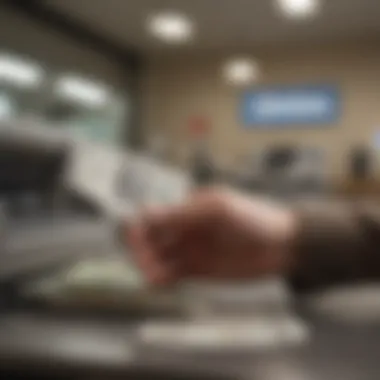Methods for Cashing Checks from Ally Bank


Intro
Cashing a check from Ally Bank may seem like a straightforward task, but navigating the nuances of the process can be a bit trickier than one might expect. As more people turn to digital banking, understanding how to handle checks is key for effective financial management. In this guide, we'll break down the essentials, showcasing where and how you can cash your check, what documentation you'll need, and other crucial details.
What makes cashing a check from a digital bank like Ally different? While traditional banks offer various branches for cashing checks, Ally operates solely online, meaning you'll need to consider several factors, including alternate locations and potential fees involved.
Let's take a closer look at how to efficiently cash a check from Ally Bank. Knowing the right information will not only empower you but also help to manage your finances better.
Understanding Ally Bank
Ally Bank has become a significant player in the online banking space, offering customers a unique blend of convenience and innovative financial solutions. Understanding Ally Bank is crucial for anyone considering cashing checks issued by this bank because it establishes the foundation upon which the bank operates. Recognizing its values, products, and the perks that come with being part of this institution is imperative for effective financial management.
Overview of Ally Bank
Ally Bank was established in 2009 and has since gained a solid reputation for providing a range of banking products without the constraints of traditional banking fees. One of its main selling points is its entirely online format, which means it does not have brick-and-mortar branches. Customers appreciate the seamless banking experience that Ally offers, as this setup often translates into reduced costs and higher interest rates on deposits compared to conventional banks. Being fully online also means that the bank can offer 24/7 customer service, which makes handling needs and inquiries comparatively smoother.
Products and Services Offered
Ally Bank offers a diverse array of financial products and services that cater to different needs:
- High-Yield Savings Accounts: These accounts typically yield higher interest rates than standard savings accounts found elsewhere, allowing customers to grow their savings more effectively.
- Checking Accounts: They feature no monthly maintenance fees, which is a rare find and popular among users looking for straightforward banking.
- Certificates of Deposit (CDs): With attractive rates and flexible terms, these products appeal to investors looking to lock in their funds for a fixed period while still earning interest.
- Investment Services: Through Ally Invest, they offer trading options in stocks, bonds, and ETFs, expanding their financial product offerings.
Ally also gives customers the ability to manage their entire financial life from one platform, which can be a great advantage when cashing checks as it streamlines various banking processes.
The Role of Checks in Banking
Checks have stood the test of time despite the digital revolution in banking. They are still vital for many transactions, particularly among those who may be less comfortable with technology or prefer tangible forms of payment. With Ally Bank, checks serve not just as a way to pay bills but also as an avenue through which individuals can access funds – especially for those receiving physical checks for services or reimbursements. They can be easier to manage than other payment forms in various contexts, making it essential to understand how to handle them when cashing. Whether it’s in cash or deposited in an account, knowing the nuances of check management can significantly affect an individual's financial experience.
Where to Cash an Ally Bank Check
Cashing checks from Ally Bank provides a gateway to accessing funds in a seamless manner. Understanding the options available can empower individuals to make informed decisions about where they choose to cash their checks. Each location comes with its own set of benefits and considerations, making it essential to explore every avenue available.
When it comes to cashing Ally Bank checks, the variation in locations—from local bank branches to check-cashing stores—means individuals can select a method that best aligns with their needs, considering convenience, speed, and sometimes even cost.
Local Bank Branches
Cashing checks at local bank branches is perhaps the most straightforward option. Many people tend to gravitate towards banks they already have an account with, as this can sometimes come with fewer barriers. If you are near a bank that has Ally Bank's affiliation, you may be able to walk in and simply present the check along with a valid ID. This option can offer immediate access to your funds, making it a preferred choice for those who value quick transactions.
However, it’s important to consider that some non-Ally banks might impose a fee or require a waiting period before you can access the funds. Therefore, checking directly with the bank beforehand can help circumvent any surprises. Always keep in mind that local bank hours may vary, so planning your visit during business hours is crucial.
Credit Unions and Their Services
Credit unions can also be a viable option for cashing checks. They often pride themselves on personalized service. For members, cashing a check can be quite seamless, and many credit unions might not impose fees that traditional banks do. If you’re not a member, you may still be able to cash a check for a fee, which typically varies from one institution to another.
This could be beneficial for those who live in communities where credit unions dominate banking options. Their commitment to community-focused banking often translates into member-first services that can make transactions feel less transactional and more personable.
Check-Cashing Stores
Check-cashing stores serve as a specialized avenue distinct from traditional banks. These establishments offer quick service and extended hours, making them a great choice for those who may not fit into the standard banking hours of nearby credit unions or banks.


Before relying solely on these venues, it’s wise to consider the fees involved. These rates can often be steeper than other options. Therefore, it would be prudent to inquire about costs ahead of time and calculate whether the convenience is worth the price.
Retail Locations Offering Cashing Services
Retail locations such as supermarkets or convenience stores have increasingly begun to offer check-cashing services. These venues can be an unexpected ally in your quest for convenience. Often open later than banks, they allow for flexibility that traditional banking options may not. However, similar to check-cashing stores, fees can be a concern.
In sum, retail locations generally charge varying fees based on the amount of the check you need to cash. It's worth taking the time to assess each option and whether the potential service aligns with your financial needs and timetable.
When cashing checks, always weigh the options against the costs involved. Your financial health could depend on the wisdom of your choices!
Online Options for Cashing Checks
In today's fast-paced digital age, the ability to cash checks online offers a distinct advantage, especially for those who may not have easy access to physical banks or check-cashing locations. This section explores online options for cashing checks drawn from Ally Bank, shedding light on what sets these methods apart, their benefits, and basic considerations when utilizing them.
Mobile Banking Solutions
Mobile banking has become an integral part of people's financial lives, offering a convenient and user-friendly way to manage banking tasks, including cashing checks. Ally Bank provides a mobile banking app that simplifies the process of depositing checks right from the comfort of your home or on the go. Here's how it works:
- Download the app: Start by downloading the Ally Bank mobile app, available on most smartphones.
- Log in securely: Use your Ally Bank credentials to access your account. Security is paramount, so ensure that you’re logged in through a secure network.
- Check deposit option: Navigate to the check deposit section of the app.
- Take a photo: Follow prompts to capture a clear photo of both the front and back of the check.
- Submit for processing: Once you have uploaded the images, submit them for processing and wait for confirmation.
This method not only provides a quick way to deposit checks but also allows for tracking the status of your deposit right through your device. Additionally, cashing checks online can sometimes result in faster access to funds when compared to traditional methods.
Third-Party Apps for Check Cashing
There are various third-party apps that facilitate check cashing, making them an appealing alternative for some users. Apps such as PayPal, Cash App, and Chime have introduced features that promote ease and accessibility for cashing checks.
- User-friendly interfaces: Many of these apps boast intuitive designs that allow even novices to maneuver through the process effectively.
- Fast transactions: Cashing checks through these platforms can often be quicker than going through a bank. Users can cash checks directly to their app accounts and transfer the funds to their bank accounts or even to a debit card.
- Low fees compared to traditional check cashing services: When using bank services, fees might be higher; however, some of these apps offer competitive pricing.
- Flexibility of handling funds: Once the check is cashed, users have the flexibility to send money, shop online, or manage their finances as they see fit.
Despite the benefits, it’s essential to exercise caution. Not all third-party apps are insured or backed by traditional banks, which could pose risks. Therefore, do thorough research and read the fine print before committing to a specific platform.
Utilizing mobile banking and third-party apps capitalizes on technology's evolution, giving you fast and convenient options, but remaining vigilant about security is crucial.
By understanding and leveraging these online options, individuals can cash Ally Bank checks effectively, saving time and effort in their financial management processes.
The Process of Cashing a Check
Cashing a check is often seen as a mundane task, yet it’s a critical part of managing one’s finances efficiently. Especially when dealing with checks issued by Ally Bank, understanding the specifics of the cashing process can prevent potential headaches. After all, you wouldn't want to find yourself in hot water when you’re trying to access your own money.
This section will walk you through the essential elements of cashing a check, including identification requirements, endorsement procedures, and how to actually receive your funds. Knowing these ins and outs can not only speed up the process but also instill confidence, ensuring that your financial transactions go off without a hitch.
Identification Requirements
When you’re ready to cash a check, it's crucial to have your identification on hand. Financial institutions, including those cashing Ally Bank checks, typically require you to present a valid ID to confirm your identity.
- Driver’s License: A government-issued driver’s license is widely accepted.
- State ID: If you don’t drive, a state-issued identification card serves the same purpose.
- Passport: Valid passports can also be used for identification, though they may not be as common.
- Military ID: For those in service, a military ID is another viable option.
These forms of ID help to verify that the person cashing the check is indeed the rightful recipient. It's recommended to ensure that your ID has not expired, as this can be a red flag for institutions.
Endorsement Procedures
Once you have your ID ready, the next critical step is endorsing the check. Endorsement is essentially signing the back of the check, which allows you to legally claim the funds. Here’s how to navigate this part smoothly:


- Sign Your Name: Write your signature in the designated area on the back of the check. Make sure your signature closely matches the one on your ID.
- Add a Note (Optional): Sometimes, people include "For Deposit Only" if they plan to deposit the check rather than cash it immediately. Though not always necessary, this can add a layer of security.
- Don’t Sign Until Necessary: Avoid signing the check until you’re at the place where you’ll cash it. This helps prevent any potential issues if you lose it en route to the bank.
These procedures assure the bank that the check has been approved for cashing and reduces the risk of fraudulent activities.
Receiving Funds
After you've completed your ID verification and endorsed the check, the final step is receiving your funds. Typically, cashing a check is fairly straightforward, but here are some things to keep in mind:
- Cash on Hand: Be prepared for the reality that some locations may run out of cash, especially in larger amounts. It’s wise to cash smaller checks first if you’re concerned.
- Option for Deposit: If you prefer not to carry cash, consider opting for a direct deposit to your bank account. This method is generally safe and efficient.
- Timing Matters: The time of day may affect how quickly you can access funds. Attempting to cash a check late in the day might mean you'll need to wait until the next business day.
By taking these steps and understanding the nuances of cashing checks, you’ll be better armed to navigate the process without any bumps along the way. Remember, knowledge is power when it comes to managing your finances.
Fees Associated with Cashing Checks
Cashing checks, especially from Ally Bank, is not always a straightforward affair. While the process itself might seem routine, understanding the fees associated with cashing checks is essential for anyone looking to manage their finances wisely. These fees can eat into your funds, so it’s crucial to be aware of what you might encounter along the way.
Understanding Fees Charged by Banks
When it comes to banks, fees can vary wildly. Ally Bank does have some distinct policies regarding check cashing, particularly when you consider your account type and the specific check involved. Here’s a rundown of potential charges:
- Service Fees: Even for account holders, Ally may charge service fees if you cash checks outside of typical transactions.
- Inspection Fees: Sometimes, checks need to go through additional verification, which might incur a fee.
- Non-Customer Fees: Those with no account at Ally Bank will likely face higher fees compared to account holders.
Before walking into the bank, it’s smart to check their website or give them a call. This way, you won’t be caught off guard.
Comparison of Fees at Check-Cashing Locations
If you’re looking for alternatives, check-cashing locations are aplenty, but be prepared for some sticker shock. The fees at these spots can be staggering when compared to traditional banks. Here’s how they stack up:
- Percentage Fees: Many check-cashing outlets charge a percentage of the check amount. This typically ranges from 1% to 5%. For larger checks, this can quickly become a significant amount.
- Flat Fees: Some places, irrespective of the check amount, might levy a flat fee. This can be beneficial for those cashing small checks but risky for bigger amounts.
- Membership Fees: Certain check-cashing establishments require memberships, which can add an extra layer of cost.
It's a good idea to do a bit of legwork before choosing where to cash your Ally check. Look up reviews, check online forums, and maybe even ask around. You wouldn’t want to end up paying more than you need to.
"Not all check-cashing services are created equal. Always compare to see where you’ll keep more of your money."
Factors to Consider When Cashing a Check
Cashing a check is not merely a matter of walking into a bank and handing it over. There are several elements to review and consider that can make or break the experience. Being aware of these factors could save you both time and money, ensuring that you're not left in a lurch when it comes to accessing your funds. Let's dissect some of these critical elements that play a role in the process of cashing a check from Ally Bank.
The Importance of Timing
Timing is everything, as they say. When it comes to cashing a check, the timing of your transaction can significantly impact how quickly you have access to your cash. Depending on when you decide to cash your check, you may encounter different processing times. If you choose to cash it during a busy period at the bank, expect longer waits. Additionally, checks may take longer to clear if they are cashed on weekends or holidays.
Moreover, be mindful that banks have specific cut-off times. For instance, if you present your check after that cut-off hour, it could be processed the next business day. Therefore, if you need funds urgently, consider cashing your check in the early morning or just after lunch when traffic tends to be lighter.
Availability of Cash
Another crucial consideration is the actual availability of cash. While you may have the ability to cash a check, there might not always be sufficient cash on-hand depending on the location where you choose to cash it. Not all banks or check-cashing outlets keep large amounts of cash in their registers, especially if you are cashing a high-value check.
It's therefore wise to do a little reconnaissance. Call ahead and verify that the location you're opting for can meet your cash needs. If all else fails, you could always choose to deposit the check and access the funds once they're made available in your account, although that may not suit everyone�’s immediate desires.


Alternative Financial Products
Lastly, consider exploring alternative financial products as a way to streamline your cashing process. Products like mobile wallets and financial apps provide a versatile option. For those who are tech-savvy, using apps that allow you to take a picture of your check can save you a trip to the bank. Services like PayPal or Venmo allow you to deposit checks digitally.
These avenues might even offer quicker access to your funds rather than going the traditional route.
In Summary
Taking into account timing, availability of cash, and alternative options can make cashing a check smoother and more efficient. Understand what matters most to you in terms of accessibility and convenience. Knowing these factors can empower you to make informed decisions about cashing checks from Ally Bank.
Security Considerations
When dealing with cashing checks, security plays a vital role in ensuring that both your funds and personal information remain protected. In the digital age, where fraudulent activities leap into action faster than one might expect, being aware of how to safeguard yourself from the potential pitfalls is essential. This section dives into the nuances of two primary facets of this topic: preventing check fraud and safeguarding personal information.
Preventing Check Fraud
Check fraud is one of the more prevalent threats individuals face today. With sophisticated counterfeit techniques and identity theft methods afloat, many might find themselves questioning the integrity of their checking experience. It’s crucial to stay alert and adopt certain practices to minimize risk. First off, examine your checks thoroughly. Look for signs of tampering or alterations; an unusual font or inconsistent ink thickness can be red flags. When receiving a check, consider its source–if something feels off, trust your instincts.
Additionally, always store checks securely. It’s an obvious point, but often overlooked. If a crucial check is lost or misplaced, it’s wise to report it immediately. Many banks, including Ally Bank, have measures in place that can help stop payment on lost checks, but acting quickly is essential. Incorporating these common-sense strategies creates layers of protection against potential fraud.
"An ounce of prevention is worth a pound of cure."
Some specific steps to take include:
- Using Secure Locations: When cashing a check, choose reputable banks or authorized check-cashing stores. These places have established protective measures and trained staff who can spot counterfeit checks.
- Verifying Authenticity: Apart from examining physical checks, be aware of the bank’s policies regarding check verification. Confirming that these documents are valid is a step too significant to skip.
- Training on Scams: Keeping up-to-date with the latest scams can go a long way. Education is your best weapon, so tune into banking newsletters or community warnings.
Safeguarding Personal Information
In any financial transaction, personal information security holds paramount importance. With an increase in data breaches, individuals must be keenly aware of how their information is stored and shared. When cashing a check, you might be required to provide a form of ID or personal details, and how you handle this can make a world of difference in your security.
First, be cautious about where you share your personal information. Don't just hand over your ID to anyone. Make sure the institution you are interacting with is legitimate. Always question the need for any extra personal details; if a cashier or system requests information that feels unnecessary, don’t hesitate to inquire why it’s needed.
Moreover, protecting sensitive documents is crucial. Shredding old bank statements and keeping your bank-related paperwork organized can reduce your risk of identity theft.
A few key recommendations for guarding personal information include:
- Limit Sharing: Share only the necessary information. Avoid sharing your Social Security number unless absolutely required.
- Conduct Regular Reviews: Consistently monitor your bank statements for any suspicious transactions. If you spot anything amiss, report it immediately.
- Employ Strong Passwords: Use unique passwords for your banking applications and change them frequently. Strong, varied passwords can help thwart unauthorized access.
By paying attention to these considerations on security, whether in cashing checks or broader financial transactions, individuals not only protect themselves from current threats but also build a groundwork of awareness and proactiveness that can have long-lasting effects.
Culmination
In today's fast-paced financial world, knowing how to cash checks, especially from reputable institutions like Ally Bank, can save both time and stress. This article has covered a range of options available for cashing checks, with an emphasis on procedures, requirements, and best practices.
Understanding the various resources ensures that individuals can choose the most suitable method for their needs. Whether it’s cashing at local branches, using online solutions, or relying on retail points, options are plentiful. Each approach comes with its own set of advantages and potential drawbacks. For instance, while banks might offer lower fees, they might not be as accessible as check-cashing stores. Conversely, while check-cashing locations can be convenient, their fees can take a bite out of the total amount.
Moreover, focusing on essential aspects such as safeguarding personal information and preventing check fraud cannot be overstated. An informed approach is the bedrock of effective financial management.
Recap of Cashing Options and Best Practices
When it comes to cashing checks from Ally Bank, here’s a recap of key options and practices to keep in mind:
- Local Bank Branches: Offers reliability and familiarity, often having lower fees.
- Credit Unions: Sometimes provide additional benefits for members, so it’s useful to check their policies.
- Check-Cashing Stores: If you need cash in a pinch, these locations are quick but can charge higher fees.
- Retail Locations: Stores like Walmart or CVS offer check-cashing services, merging convenience with accessibility.
- Mobile Banking Apps: Innovations like photo checks allow cashing checks anytime, anywhere, making it super handy.
- Third-Party Solutions: Be cautious but consider them as they might offer competitive terms.
The best practices include always double-checking identification requirements, understanding the fees involved, and ensuring the endorsement protocols are correctly followed. Keeping track of these factors helps mitigate risks and ensures a smoother cashing experience.
Ultimately, empowering oneself with the right information about cashing checks promotes better financial decisions, leading to greater control over one’s finances.















